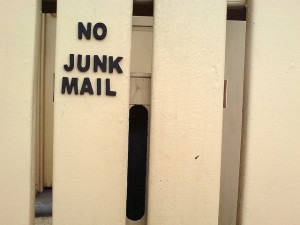OK, so as authors we are told constantly that we have to market our own books. The publishing industry, for better or worse, has largely washed its hands of promotion, except for the lucky and most commercial few. The rest of us are largely on our own.
Authors must have a website (check), keep a blog (check), have a Twitter account (yup), and a Facebook page (uh-huh), and use them regularly. Some writers have mailing lists, guest blog, write op eds and so on, all in service of selling more copies. It’s a big job and very time-consuming. If done well, it’s breathtaking to watch. If done clumsily, the result is painful to behold.
Promoting a finished book can take over your life to such an extent that there’s little room left to dream up, research, or write a new one. This seems problematic to me. After all, if we’re not writing, then what’s the point?
So, I’ve been wondering: how much flogging is too much?
It’s a question I’ve been thinking about increasingly as my inbox is clogged again and again by the newsletter (one I never subscribed to) of an author who has made it his full-time job to promote a newish book (actually, it’s over a year old). And each time the newsletter arrives, announcing a new lecture, reading, or reminding me what a good gift the book would make for whatever occasion, I find myself a little more irritated than the last. Annoying readers can’t be a good marketing strategy. The fact is, I own the book and I’ve read it, so why am I being bombarded with pitch after pitch? When is enough enough? And how can an author avoid going over the same old territory again and again?
As part of Canada Reads, Coach House Books posted what I think is good advice on how authors can use social media more effectively than the above-mentioned author has:
Also important to remember: not only are you a human being, but so are your readers. Many of those readers are fellow authors, artists, and all-round smart people. They are not just buyers or cash cows or vehicles for gushing blurbs that pop up on Amazon. They are the reason you rewrite a sentence 12 times and the community for whom you stay in the library until closing. Talk to them. Listen to them. Don’t just bombard them with junk mail.
Now, off to work.
[Photo: lonely radio]



